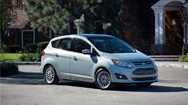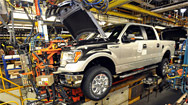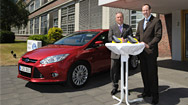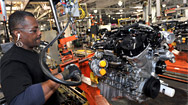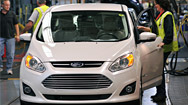Ford South America: Climate Change and the Environment
Ford is focused on minimizing the environmental impacts of our vehicles and operations, including reducing our contribution to climate change.
We are committed to doing our share to prevent or reduce the potential for environmental, economic and social harm due to climate change. We have a science-based strategy to reduce greenhouse gas (GHG) emissions from our products and processes that focuses on doing our share to stabilize carbon dioxide (CO2) concentrations in the atmosphere. On the product side, we have also made a commitment to deliver the most fuel-efficient vehicles in every market in which we participate. In South America, we have committed to improving fuel economy across our product lineup.
We are improving fuel economy in South America by introducing some of the efficient engine and transmission technologies currently used in North America, and by using technologies specifically relevant to the widespread use of biofuels in Brazil. In 2011 in Argentina, we introduced the Ford Mondeo with an EcoBoost® engine, which marked the debut of EcoBoost technology in South America. We are continuing to implement the new, more-efficient Sigma engine, which improves efficiency compared to current engines through reduced internal friction and improved electronic throttle controls. We have also improved the gearing ratios, aerodynamics and rolling resistance of our South American models, further increasing fuel economy. In 2012, we launched several new fuel-efficient products. In Brazil, for example, we launched the new Ford Fusion with a 2.0L EcoBoost engine. Also in Brazil, Ford produces a global vehicle line with advanced flex-fuel technology, allowing the use of locally produced ethanol.
For the 2012 model year and beyond, we are planning to introduce even more fuel-efficient twin independent variable cam timing engines and direct-injection engines, Battery Management Systems, smart alternator systems, dual-clutch automatic transmissions and improved aerodynamics in the B- and C-sized vehicle segments, which make up approximately 80 percent of the Brazilian market.
Aligned with our global standards and the Brazilian New Automotive Regime (Inovar Auto) – a federal government measure that aims to stimulate investment in the Brazilian auto industry – Ford Brazil is focusing on achieving fuel-efficiency targets and investing in engineering. Also in Brazil, newly introduced fuel economy and CO2 emission regulations will speed up the introduction of new fuel-efficiency technologies, including three-cylinder engines, EcoBoost engines, Auto Start-Stop technology, Active Grille Shutter Systems that improve aerodynamics, and lower-rolling-resistance tires.
Ford is also using recycled and/or natural material in our vehicles in South America. All vehicles locally produced use 5 to 7 kg of recycled PET plastic in the form of carpets, ceiling linings, wheel boxes and acoustic blanket carpeting. And, the instrument panel of the new Cargo trucks is made with sisal natural fiber.
We are the first automobile company in Brazil to voluntarily report our facilities’ GHG emissions to the Brazilian Greenhouse Gas Protocol. As a participant and one of the founders of the Protocol, we have conducted an inventory of our facility emissions and have set reduction goals. The results of the inventory can be seen in the graph below. Our absolute GHG emissions went up in 2012. Our GHG emissions per unit of production also showed an increase of approximately 38 percent compared to 2011, due to the 2012 electricity CO2 emissions factor increase of 135 percent from 2011 and an overall decrease in production of 9.7 percent. (Regardless of production rates, plants require a minimum energy base load and operate most efficiently at high capacity. Generally, GHG emissions per unit of production trend upward when production decreases and trend downward when production increases.) For the 2012 emissions year, therefore, it was difficult to accurately determine the impacts of any facility process improvements.
Historical Emissions by Scope

| Year | Emissions (tCO2e) | |
|---|---|---|
| Scope 1 | Scope 2 | |
| 2008 | 25,925.00 | 17,392.00 |
| 2009 | 26,826.00 | 8,758.00 |
| 2010 | 48,834.23 | 18,620.00 |
| 2011 | 36,215.28 | 10,655.00 |
| 2012 | 35,278.41 | 23,769.00 |
The conservation of native vegetation at our plants is also a priority. Employees at the Camaçari, São Bernardo do Campo, Troller, Taubate and Tatui facilities, as well as the Miguel de Oliveira Port, took part in a variety of environmentally focused events, ranging from workshops and lectures to nature walks and site visits. At several locations, employees were given plants and seeds for their gardens.
For a discussion of our global climate change impact, policy and commitments please see the Climate Change and Environment section.




